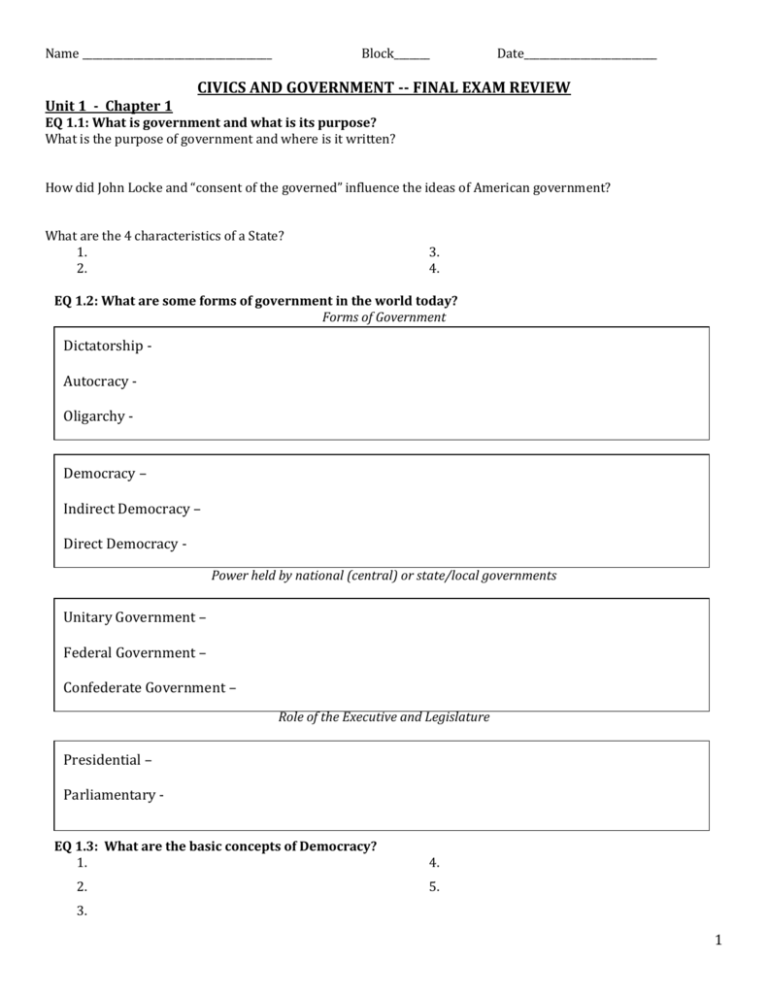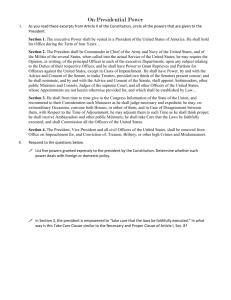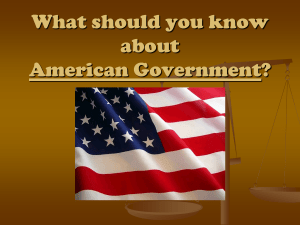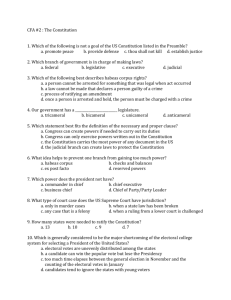civics and government -- final exam review
advertisement

Name _____________________________________ Block_______ Date__________________________ CIVICS AND GOVERNMENT -- FINAL EXAM REVIEW Unit 1 - Chapter 1 EQ 1.1: What is government and what is its purpose? What is the purpose of government and where is it written? How did John Locke and “consent of the governed” influence the ideas of American government? What are the 4 characteristics of a State? 1. 2. 3. 4. EQ 1.2: What are some forms of government in the world today? Forms of Government Dictatorship Autocracy Oligarchy - Democracy – Indirect Democracy – Direct Democracy Power held by national (central) or state/local governments Unitary Government – Federal Government – Confederate Government – Role of the Executive and Legislature Presidential – Parliamentary EQ 1.3: What are the basic concepts of Democracy? 1. 2. 4. 5. 3. 1 Citizen’s Duty Citizen’s Responsibility Unit 1 - Chapter 2 EQ 2.1: What ideas and traditions influenced government in the English colonies? How did American laws mirror British laws? EQ 2.2: What events and ideas led to American independence? Why were the Colonists upset with British rule? EQ 2.3: What weaknesses in the Articles of Confederation made a lasting government impossible? Who are the framers? What was the first Constitution of the United States? List 3-5 problems with this document that would eventually need to be fixed. EQ 2.4: What compromises enabled the framers to create the Constitution? An argument over representation in government took up much of the Framers’ time. Explain the ideas and their decision below: New Jersey Plan Virginia Plan Connecticut Plan (a.k.a. Great Compromise) 3/5 Compromise – EQ 2.5: What issues aroused the vigorous debate over ratification of the U.S. Constitution? Which group of people wanted to RATIFY the Constitution? Did they want a strong central government or strong state and local governments? Which group of people did not want to RATIFY the Constitution? WHY? Did they want a strong central government or strong state and local governments? 2 Unit 1 - Chapter 3 EQ 3.1: What are the six main principles on which the Constitution is based? BASIC PRINCIPLES OF DEMOCRACY DEFINE AND/OR EXPLAIN Popular Sovereignty Limited Government Separation of Powers Checks and Balances Judicial Review Federalism EQ 3.2: How has the Constitution been amended through the formal amendment process? List the 4 possible ways the Constitution can be amended: 1. 2. 3. 4. How many amendments have been added to the Constitution? What are the first 10 Amendments known as? Unit 1 - Chapter 4 EQ 4.1: How is power divided between the Federal Government and the States? TYPES OF POWERS FEDERAL STATE Expressed - EX: Reserved – Concurrent - Implied – EX: EX: EX: 3 EXECUTIVE _______________ laws List some of the powers of this branch below. LEGISLATIVE _______________ laws List some of the powers of this branch below. JUDICIAL _______________ laws List some of the powers of this branch below. Give an example of checks and balances for each of the branches: ExecutiveLegislative = Legislative Executive = Judicial Executive = EQ 4.3: How do the States work together to preserve the Union? Full faith and credit clause – Extradition – Unit 2 - Chapter 5 EQ 5.1: Does the two-party system help or harm democracy? What is the main purpose of a political party? How do political ideologies help develop political platforms? What are the five duties of a Political Party? 1. 2. 3. 4. 5. How did the battle of the constitution help develop a two-party system in the United States? EQ 5.2: How has the two-party system affected the history of American government? Explain how the country’s political system transitioned from the Federalists and Anti-Federalists to the Democrats and Republicans. 4 EQ 5.3: What role have minor parties played in American politics? How do minor parties influence the United States two-party system? EQ 5.4: How are political parties organized at the federal, State, and local levels? Federal State Local Leadership Job/Role Nominations Unit 2 - Chapter 6 EQ 6.1: How have voting rights changed over the course of American history? Expansion of Voting Rights in the United States Original Electorate (Originally who could vote?) Expansion Era #1 Expansion Era #2 (15th Amendment) Expansion Era #3 (19th Amendment) Expansion Era #5 (26th Amendment) EQ 6.2 What are the qualifications for voting, and how have they changed over time? Describe/define the following terms: Poll Tax Gerrymandering Literacy Disenfranchised Required Voter Qualifications: 1. 2. 3. 4. 5 EQ 6.4: What factors influence voter behavior? (List as many as you can below) Compare and contrast voter turnout between general elections and off-year elections. Unit 2 - Chapter 7 EQ 7.1: What methods are used to choose candidates for public office? EQ 7.2: How are elections conducted in the United States? What are the 5 methods of nomination? 1. 2. 3. 4. 5. What is the difference between an open primary and a closed primary? Who sets the rules for elections and how are elections carried out? EQ 7.3: What role does money play in electoral politics? What role does money play in electoral politics? Consider the vocabulary: Political Action Committees, Federal Election Commission, hard money, soft money, subsidy (Presidential Election Campaign Fund) How does the government regulate money in elections? Who is responsible for doing this? Unit 2 - Chapter 8 EQ 8.1: What is public opinion, and what factors help to shape it? EQ 8.2: How is public opinion measured and used? 6 EQ 8.3: How has the development of different media helped inform the public about politics? What is public opinion and what factors help shape it? Unit 2 - Chapter 9 EQ 9.1: What roles do interest groups play in our political system? EQ 9.2: What are the different types of interest groups at work in American society? EQ 9.3: In what ways do interest groups attempt to influence government and public opinion? What is the main goal of interest groups and how can they be compared to political parties? Features of Interest Groups Positive Negative Types of Interest Groups: 1. Economic Interest Groups 2. 3. 4. 5. How do lobbyists impact/work with the branches of the U.S. government? Interest Groups in Government Executive Legislative Judicial “Grass Roots” What is the difference between Direct Lobbying and Indirect Lobbying? 7 Unit 3 - Chapter 10 EQ 10.1: Why does the Constitution establish a bicameral legislature? EQ 10.2: How are the seats in the House distributed and what qualifications must members meet? EQ 10.3: How does the Senate differ from the House? EQ 10.4: What roles and functions do members of Congress perform? What two houses make up the bicameral legislature? 1. 2. Define: Census CONGRESS House of Representatives Senate Term Length Age Citizenship Residency Total # of Members # of Members per State Describe the personal backgrounds of members of Congress: How do members of the Senate and the House of Representatives represent their people of their state differently? Unit 3 - CHAPTER 11 EQ 11.1: What powers over money and commerce does the Constitution give to Congress and what limits does it put on these powers? EQ 11.2: How do the expressed powers reflect the Framers' commitment to creating a strong but limited National Government? EQ 11.3: How has the doctrine of implied powers increased the powers of Congress? EQ 11.4: What nonlegislative powers does the Constitution delegate to Congress? EXPRESSED POWERS Definition: 1. 2. 3. 4. 5. Collect Taxes Borrow Money Regulate Trade Rules for Bankruptcy Coin Money-Currency, etc. 6. Punish Counterfeiting 7. Establish Post Office and Roads 8. Issue Patents and Copyrights IMPLIED POWERS NON-LEGISLATIVE POWERS Definition: Definition: The Expressed Power to collect taxes ALSO allows Congress to - punish tax evaders - issue and outlaw licenses - require states to do things to qualify for federal funding Changing the law of the land is not creating laws. This is called an Amendment The expressed power to regulate naturalization (citizenship) allows ALSO Congress to: If a Presidential candidate does not reach the 270 electoral votes needed to win a majority, Congress will: - pick the winner - House members of a state get one vote for President - Senate picks Vice President 8 9. Create lower courts 10. Punish Piracies 11. Declare war 12. Raise an Army 13. Maintain a Navy 14. Create rules for the Military 15. Call up the militia 16. Train a militia 17. Government may purchase land with permission of that state (parks) 18. Necessary and Proper Clause - regulate and limit immigration The expressed power to regulate trade ALSO allows Congress to: - establish minimum wage - regulate banking - ban discrimination in work - protect the disabled in work If an elected official commits a crime, they may be impeached This is a two-step process. - The House of Representatives will impeach (charge an official with a crime) - The Senate will put the official on trial The expressed power to establish post offices also allows Congress to: - prohibit mail fraud - prohibit shipping certain items The senate can also approve or reject presidential appointments and expects the President to ask President to ask for their advice and consent before nominating someone to a position or before making a treaty with another country What is the difference between a Strict Constructionist and a Liberal (loose) Constructionist? What is the importance of the Necessary and Proper Clause? What is eminent domain? What is the difference between a patent and a copyright? Unit 3 - CHAPTER 12 EQ 12.1: How do constitutional and party officers keep Congress organized? EQ 12.2: How do committees help Congress do its work? MEMBERS OF CONGRESS Speaker of the House President of the Senate President Pro Tempore Majority Leader Minority Leader Whip 9 Committee Chairman Seniority Rule Standing Committee How do Standing Committees help Congress do its work? EQ 12.3: What steps does a successful bill follow as it moves through the House? EQ 12.4: What are the major differences in the lawmaking process in the House and the Senate Who can introduce a bill in the Senate? Who can introduce a bill in the House? What is a filibuster, why is it used, and in which house of Congress is it used? COMPARING THE HOUSE AND THE SENATE HOUSE SENATE Fewer Committee assignments More committee assignments More formal less flexible rules Fewer, more flexible rules Committee work usually more important than floor Floor debate often more important than committee debate in shaping outcome of legislation work in shaping the outcome of legislation Floor debate strictly limited Floor debate largely unlimited, but subject to cloture vote by 60 senators to end debate Smaller Personal Staffs Larger personal staffs **Be able to describe the process of how a BILL becomes a LAW** Unit 4 - Chapter 13 EQ 13.1: What are the roles and qualifications of the office of the President? The President’s Job Description What are the 8 presidential roles? Summarize each in one short sentence. # Role: Brief Summary 1 2 3 4 5 6 7 8 10 What are the three formal qualifications to become president? a. __________________________________________________ b. __________________________________________________ c. __________________________________________________ How long can a president serve in the office? What amendment made this official? Why would some people say that setting a term limit is unfair? Who sets the pay of the president? _______________________ EQ 13.2: What occurs when the President is unable to perform the duties of the office? ___________________________: is defined as the plan to fill the vacancy in the presidency. If a president ______________, resigns or __________________________ the ________ becomes President. What amendment created this? __________________________________ Explain the Presidential Succession Act of 1947: After the Vice President, _____________________ would take office followed by __________________, _________________________ and _______________________. What are the duties of the Vice President? Balancing the Ticket: Two formal Duties: 1. 2. EQ 13.3: How did the process of choosing a President change over time? What were the 3 original plans the Framers wanted to use to choose the President?? 1. 2. 3. The Framers decided to use the Electoral College system of choosing the president. In 1789, explain why they chose the EC over other options: Define Electoral College: What was the problem in the 1800 election? Why did this cause a change in the Electoral College system? 11 What did the 12th Amendment do? EQ 13.4: Does the nominating system allow Americans to choose the best candidates for President? Look on page 325 in your text. “Political parties originally used _______________ to nominate their presidential candidates. In 1832, both major parties had began to use ____________________________ to nominate candidates, which is still used today. The conventions are ran by the _________________ instead of ____________ or _____________ law. Delegates from each state are chosen to attend the convention. The number of delegates depends on that state’s ________________________. What is the presidential primary? (pg. 327) What are caucuses (page 327)? Which state holds the first primary? What state holds the first caucus? What is the national convention? What are 3 goals of the national convention? a. __________________________________________________ b. __________________________________________________ c. __________________________________________________ EQ 13.5: Does the election process serve the goals of American democracy today? How often do we have presidential elections? ______________________ Have wars or other national crisis ever stopped an election from happening? What are swing voters? YES NO What are battleground states? Explain how debates are both helpful and harmful for Presidential candidates. (page 332) When people vote in a presidential election, we are really voting for _______________________, because the Constitution states that the _____________________ elects the president. 12 DELEGATES vs. PRESIDENTIAL ELECTORS (Electoral College) DELEGATES PRESIDENTIAL ELECTORS USED IN WHAT ELECTION PRIMARY ELECTIONS GENERAL ELECTIONS WHAT IS THEIR PURPOSE At the convention, they officially select a candidate to run for their party in the general election. HOW MANY ARE THERE The political party determines how many delegates each state gets. ( Typically relative to population. ) During the general election, they cast their vote in each state according to the # of electoral votes given/state. Equal to # Senators & # Representatives in Congress In order to win a presidential election, a candidate must win a majority of votes ( ________ out of _______ votes_) What happens if there is no clear majority? Two advantages of the Electoral College System. Two problems with the Electoral College System ELECTORAL COLLEGE REFORMS THE PLAN DISTRICT PLAN NATIONAL POPULAR VOTE PLAN DIRECT POPULAR ELECTION PROPORTIONAL PLAN WHAT IT SAYS: The two electors would be chosen from each state. They would be required to vote in line with their state’s popular vote. Other electors would come from each state’s congressional districts States would amend their individual laws. The new state laws all of a state’s electoral votes are awarded to the candidate who wins the majority of the popular vote. Each vote in the nation would count equally. The winner would always be the majority choice. This plan would do away with the Electoral College system. Each candidate would get a share of the electoral vote equal to their share of the popular vote. (example: PA Candidate A: 60% Candidate B: 40%) Candidate A: 12 Candidate B: 8 13 Unit 4 - Chapter 14 EQ: 14.1 | What factors have contributed to the growth of presidential power? Article _______ Section _______ lists the powers of the President. The President is in charge of the ___________________ branch. When have the powers of the president expanded? (give examples or think of times its happened : pg. 342-343) EQ 14.2: What are the executive powers and how were they established? THE EXECUTIVE POWERS OF THE PRESIDENT: POWER DESCRIPTION/EXAMPLES 1. ORDINANCE 2. APPOINTMENT 3. REMOVAL 4. EXECUTIVE PRIVILEGE EQ 14.3: What tools are available to the President to implement foreign policy? THE DIPLOMATIC & MILITARY POWERS OF THE PRESIDENT: POWER DESCRIPTION/ EXAMPLES 1. TREATIES 2. EXECUTIVE AGREEMENTS 3. RECOGNITION 4. COMMANDER-IN-CHIEF 14 EQ 14.4: How can the President check the actions of the legislative and judicial branches? THE LEGISLATIVE & JUDICIAL POWERS OF THE PRESIDENT: POWER DESCRIPTION/ EXAMPLES 1. LEGISLATIVE POWERS 2. JUDICIAL POWERS Unit 4 - Chapter 15 EQ 15. 1 | What is the structure and purpose of the federal bureaucracy? What is a bureaucracy? What are the three main purposes/man elements of a bureaucracy? a. __________________________________________________ b. __________________________________________________ c. __________________________________________________ Fill in the chart below using your notes for the bureaucracy of the Executive Branch. 15 EQ 15.2: What agencies and advisors are part of the Executive Office of the President and what are their functions? Explain the purpose and how each of the following operate in the Executive Branch. EXECUTIVE OFFICE OF THE PRESIDENT: THE WHITE HOUSE OFFICE: Who is the leader of this office? NATIONAL SECURITY COUNCIL: OFFICE OF MANAGEMENT & BUDGET EQ 15.3: What is the Cabinet and what does it do? What is the role of the modern day cabinet today vs. the original cabinet under George Washington? What titles are given to the leaders of the Cabinet? How many Cabinet departments are there? _____________ What is the Attorney General? How are Cabinet members selected? What are the 2 main sources of advice for the President? EQ 15.4: What are the roles and structures of the independent agencies? What is an independent agency? 16 Unit 5 - Chapter 18 EQ 18.1: What are the structure and function of the national judiciary? DUAL COURT SYSTEM ___________________________ COURT SYSTEM ________________________ COURT SYSTEM __________________________________ COURTS _________________________________ COURTS Where are the powers of the Judicial Branch found? Be specific. Which was the ONLY court created by the Constitution? Who may (and did) create the other courts? To be a judge you must be appointed by _____________________________ and confirmed by the _______________ Define precedent: Judicial Activism Judicial Restraint EQ 18.2: What are the structure and jurisdiction of the inferior courts? EQ 18.3: What is the Supreme Court's jurisdiction, and how does it operate? Which of these uses a jury or just uses judges? 17 TYPE OF JURISDICTION Original Jurisdiction Appellate Jurisdiction EXPLAIN WHICH COURTS HAVE THIS? CRIMINAL CASES Example: CIVIL CASES Example: What are the THREE possible outcomes when a Judge from an appellate court rules on a case? 1. 2. 3. What is judicial review and how did the case Marbury v. Madison establish the court’s power of judicial review? If the Supreme Court agrees to hear a case, they will issue a ____________________________________________________________ The S.C. justices who agreed and made the decision of the court will issue the ________________________________________ The S.C. justices who disagreed with the decision of the court will issue the __________________________________________ Unit 5 - Chapter 19 EQ 19.1: How does the Constitution protect the rights of individuals against government? How do these Amendments protect your rights? Amendment Explanation 4th 5th 9th 14th 18 What is the difference between civil liberties and civil rights? EQ 19.2: How does the 1st Amendment protect the freedom of religion? Establishment Clause – Free Exercise Clause What is the relationship like between religion and public places like schools, courthouses, etc? EQ 19.3: What are the limits on the guarantees of free speech and free press? What is the main difference between libel and slander? Why is sedition illegal? EQ 19.4: How has the Supreme Court ruled on assembly and petition cases? List some of the rules (permitted behavior or restrictions) placed on citizens’ right to assemble: Unit 5 - Chapter 20 EQ 20.1: Why is the concept of due process important to a free society? What is due process? EQ 20.2: How does the Constitution protect the freedom and security of the person? Explain how citizens are protected from unreasonable search and seizure. (Think: what are citizens’ rights, what do cops need in order to search, etc) Are there circumstances where a police officer can act without approval to search you or private property? Explain. 19 EQ 20.3: What protections does the Constitution set out for persons accused of crimes? Explain how the following protect YOU when being prosecuted by the law? Writ of habeas corpus – *Bill of attainder – *Ex post facto laws – Double jeopardy – Miranda rule – What is the difference between a grand jury and a petit jury? EQ 20.4: How does the Constitution set limits on the punishments for crime? Criminals are protected under the _______ Amendment Bail is money paid to ________________________ as a promise to ________________________________________________________ A court may not sentence a convicted criminal to the death penalty if: 1. 2. 3. What kinds of activities could be considered as treason? 1. 2. 3. 20







